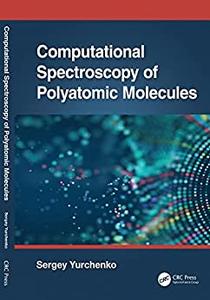
Free Download Computational Spectroscopy of Polyatomic Molecules by Sergey Yurchenko
English | February 6, 2023 | ISBN: 1498761194 | 206 pages | PDF | 15 Mb
This book provides a detailed description of the modern variational methods available for solving the nuclear motion Schrödinger equation to enable accurate theoretical spectroscopy of polyatomic molecules. These methods are currently used to provide important molecular data for spectroscopic studies of atmospheres of astronomical objects including solar and extrasolar planets as well as cool stars. This book has collected descriptions of quantum mechanical methods into one cohesive text, making the information more accessible to the scientific community, especially for young researchers, who would like to devote their scientific career to the field of computational molecular physics.
The book addresses key aspects of the high-accuracy computational spectroscopy of the medium size polyatomic molecules. It aims to describe numerical algorithms for the construction and solution of the nuclear motion Schrödinger equations with the central idea of the modern computational spectroscopy of polyatomic molecules to include the construction of the complex kinetic energy operators (KEO) into the computation process of the numerical pipeline by evaluating the corresponding coefficients of KEO derivatives on-the-fly. The book details key aspects of variational solutions of the nuclear motion Schrödinger equations targeting high accuracy, including construction of rotational and vibrational basis functions, coordinate choice, molecular symmetry as well as of intensity calculations and refinement of potential energy functions. The goal of this book is to show how to build an accurate spectroscopic computational protocol in a pure numerical manner of a general black-box type algorithm.
This book will be a valuable resource for researchers, both experts and not experts, working in the area of the computational and experimental spectroscopy; PhD students and early-career spectroscopists who would like to learn basics of the modern variational methods in the field of computational spectroscopy. It will also appeal to astrophysicists and atmospheric physicists who would like to assess data and perform calculations themselves.
Key features:
Supported by the latest research and based on the state-of-the-art computational methods in high-accuracy computational spectroscopy of molecules.
Authored by an authority in the field.
Accessible to both experts and non-experts working in the area of computational and experimental spectroscopy, in addition to graduate students.










Leave a Reply
You must be logged in to post a comment.